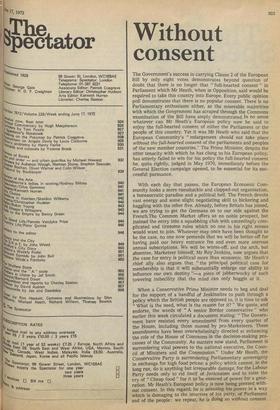Without consent
The Government's success in carrying Clause 2 of the European Bill by only eight votes demonstrates beyond question of doubt that there is no longer that "full-hearted consent" in Parliament which Mr Heath, when in Opposition, said would be required to take this country into Europe. Every public opinion poll demonstrates that there is no popular consent. There is no Parliamentary enthusiasm either, as the miserable majorities' with which the Gov,ernment has scraped through the Commons examination of the Bill have amply demonstrated. In no sense whatever can Mr Heath's European policy now be said to enjoy the full-hearted consent of either the Parliament or the people of this country. Yet it was Mr Heath who said that the European Community's "enlargement should not take place without the full-hearted consent of the parliaments and peoples of the new member countries." The Prime Minister, despite the utter tenacity with which he has clung to his European policy, has utterly failed to win for his policy the full-hearted consent he, quite rightly, judged in May 1970, immediately before the General Election campaign opened, to be essential for its successful pursuance.
With each day that passes, the European Economic Community looks a more ramshackle and clapped-out organisation, a bureaucratic paradise and a political hell. The French devote vast energy and some slight negotiating skill to bickering and haggling with the other five. Already, before Britain has joined, we are trying to get the Germans on to our side against the French.The Common Market offers us no noble prospect, but instead the entry into a squabbling club with exteedingly complicated and tiresome rules which no one in his right senses would want to join. Whatever may once have been thought to be the case, no one now pretends that we will be better-off for having paid our heavy entrance fee and even more onerous annual subscriptions. We will be worse-off, and the arch, but absentee, 1Vlarketeer himself, Mr Roy Jenkins, now argues that the case for entry is political more than economic. Mr Heath's chief ally also argues that "the principal political case for membership is that it will substantially enlarge our ability to influence our own destiny "—a piece of jabberwocky of such towering imbecility that the mind can only boggle at it.
When a Conservative Prime Minister needs to beg and deal for the support of a handful of Jenkinsites to push through a policy which the British people are opposed to, it is time to ask "What is the need, what is the reason for it?" We quote, and endorse, the words of "A senior Border conservative who earlier this week circulated a document stating: "The Government have resisted every amendment from every quarter of the House, including those moved by pro-Marketeers. These amendments have been overwhelmingly directed at enhancing the role of the House of Commons in the decision-making processes of the Community. As matters now stand, Parliament is surrendering vital powers to the national executive, the Council of Ministers and the Commission." Under Mr Heath, the Conservative Party is surrendering Parliamentary sovereignty in exchange for high food prices: a policy which cannot, in the long run, do it anything but irreparable damage, for the Labour Party needs only to rid itself of Jenkinsism and to raise the cry of "Cheap food" for it to be ensured of power for a generation. Mr Heath's European policy is now being pressed without consent. In this regard, he is misusing his power in a way which is damaging to the interests of his party, of Parliament and of the people : we repeat, he is doing so without consent.










































 Previous page
Previous page